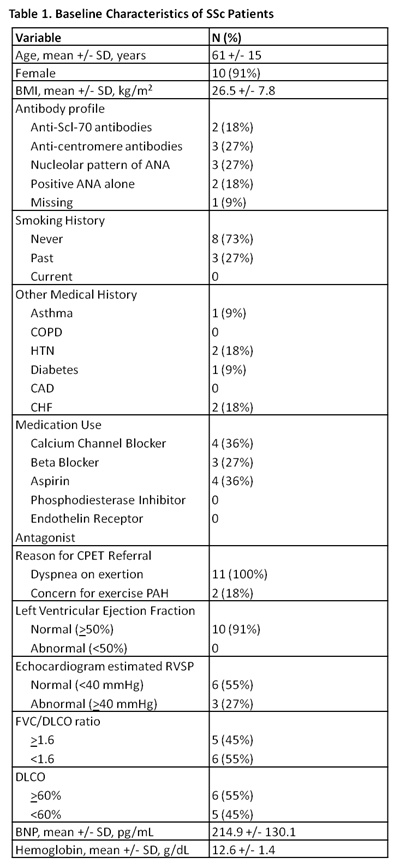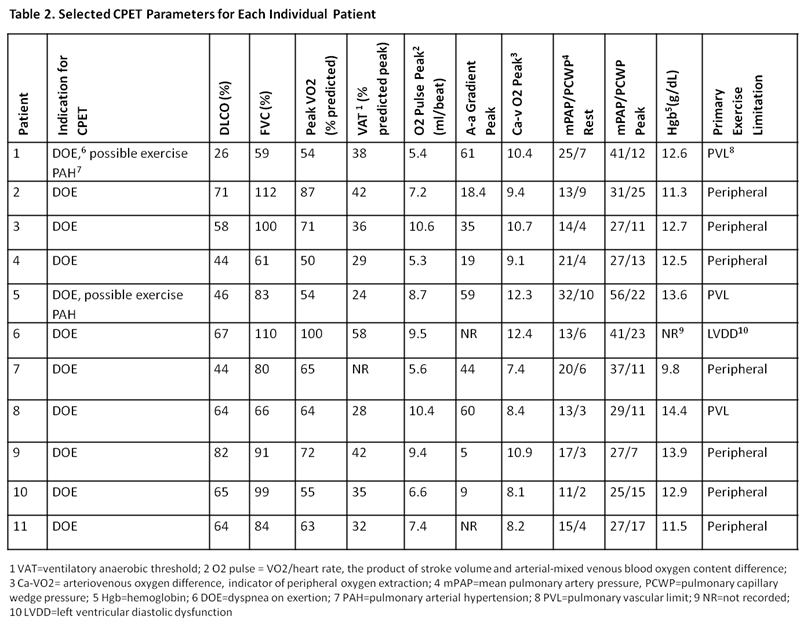Session Information
Date: Tuesday, November 10, 2015
Title: Systemic Sclerosis, Fibrosing Syndromes and Raynaud's - Clinical Aspects and Therapeutics Poster III
Session Type: ACR Poster Session C
Session Time: 9:00AM-11:00AM
Background/Purpose:
Patients with systemic sclerosis (SSc) experience dyspnea for multiple reasons. Cardiopulmonary exercise testing (CPET), an important tool in the evaluation of undifferentiated dyspnea, provides integrated metabolic and hemodynamic measures during exercise. Few studies have utilized CPET in SSc.1 In this study we evaluated exercise limitations in SSc patients as determined by CPET combined with invasive hemodynamic measurements (level 3 CPET).
Methods:
This was a single center, retrospective review of all SSc patients who underwent level 3 CPET between February 2006 and February 2015. Level 3 CPET consists of graded exercise on a cycle ergometer with metabolic cart and simultaneous measurement of pulmonary and systemic arterial hemodynamics. Primary reasons for exercise limitation include left ventricular diastolic dysfunction (LVDD), a peripheral limit (impairment in the ability of the muscles to extract and use oxygen), a pulmonary vascular limit (PVL, i.e. PAH) or a pulmonary mechanical limit. Demographic and clinical information was extracted from medical records.
Results:
Eleven patients were included in this analysis. Nine of the eleven patients met the 2013 ACR SSc classification criteria. Two had missing information that precluded the definitive classification as SSc, but fell within the spectrum of SSc disease. Baseline characteristics are shown in Table 1. 91% of patients were female and the mean age was 61 years. Seven of eleven (64%) patients had a peripheral extraction limitation; the remaining four had LVDD or PVL (Table 2). Three of the seven patients with a peripheral limit to exercise were anemic, defined by hemoglobin <12 g/dL, the lower limit of normal in our laboratory.
Conclusion:
Our findings provide novel insight into less explored etiologies of dyspnea and exercise limitation in SSc patients. Only one prior study reported findings similar to ours, but that study did not employ invasive CPET.2 Of note, only three of the seven patients with a peripheral limit in our study were anemic, suggesting alternative mechanisms for impaired peripheral oxygen extraction. The systemic vasculopathy characteristic of SSc is likely present in muscle and may contribute to impaired oxygen utilization. Our findings call for larger studies to address the possible mechanisms of peripheral limitation in SSc patients, and even suggest a potential therapeutic role for agents with vascular targets that may improve peripheral extraction, resulting in improved dyspnea and exercise tolerance in SSc patients.
References
1. J. Rheum. 2010. 37:1871.
2. Am J Med. 1993. 95:413.


